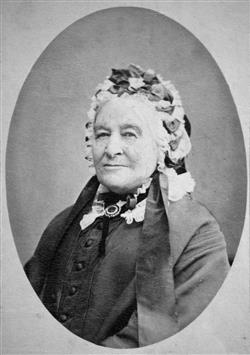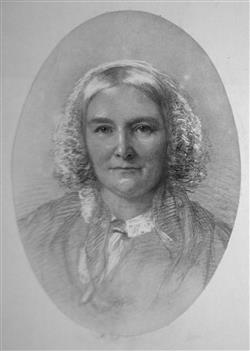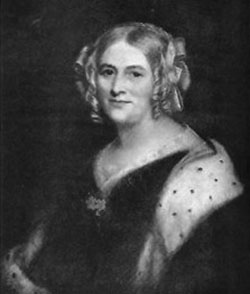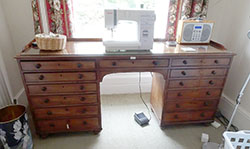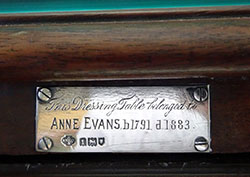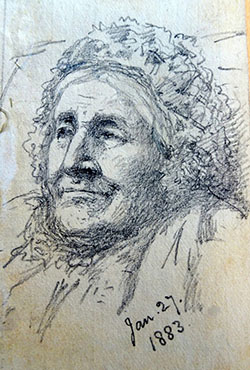Anne DICKINSON 1791 - 1883
Eighth child, fourth daughter of Thomas DICKINSON 1754 - 1828 and Frances de BRISSAC 1760 - 1854.
Born 30th July 1791, baptized at St Pancras, then fully 'christened' at Greenwich.
(Sponsors John Courtney Esq., Mr Masterman and her aunt Mrs Bernard..)
Died 10th May 1883
Married 17 June 1819, the Rev Arthur Benoni EVANS D.D. (1781-1854)
Anne and Arthur had six children
Their children were –
1. Anne EVANS, 4 June 1820 – 19 Feb. 1870; buried at Kensal Green 24 Feb 1870
2. Arthur EVANS, 9 Jan. 1822 – 21 April 1850; ordained; curate of St John’s Coventry. Buried at Market Bosworth.
3. John EVANS KCB 17 Nov. 1823 – 31 May 1908;
m. 1) 12 Sept. 1850, his cousin Harriet Ann DICKINSON. She d. leaving five children, 1 Jan 1858 and was buried at Abbot’s Langley, Herts.
m. 2) 23 July 1859, his cousin Frances PHELPS who died 22 Sept. 1890 and was buried at Abbot’s Langley, Herts.
m. 3) 9 July 1892 Marie Millington LATHBURY (4 Dec. 1856 – 4 June 1944) – one daughter (Joan Evans)
4. George EVANS, 17 May 1825 – d. in Madeira 25 Jan 1847 and was buried in the Old Cemetery, Funchal.
5. Emma EVANS, 13 Sept. 1828 – 2 June 1905;
m. 10 Jan 1856 Dr John Waddington HUBBARD MRCS (Member Royal College of Surgeons) of Market Bosworth, Leics. Five children.
6. Sebastian EVANS, 2 March 1830 – 18 Sept. 1909;
m. 6 April 1858, Elizabeth GOLDNEY dau. of Francis Bennett Goldney Esq. of the Manor House, Brixton. Two children.
From the Evans family record book.
Portrait by Henry Moseley 1847
Husband
'In the eyes of Arthur Benoni Evans all the endearing qualities of the Bramblebury circle came gradually to be concentrated in the person of Anne, a woman ten years younger than himself. She was well made, reasonably tall, with beautiful short-sighted hazel eyes, curly brown hair, a broad forehead and an aquiline nose: not a beauty, but a handsome woman whose handsomeness was to increase with maturity. Even in youth she had an odd air of wisdom about her, that must have made her a difficult woman to propose to; but somehow Arthur Evans overcame the difficulty, and his suit was accepted.
No one could call him a good match, but he was a scholar and a gentleman, and held what seemed a secure position at Sandhurst. The Dickinsons gave their consent and produced a modest marriage settlement, and Arthur Benoni Evans and Anne Dickinson were married by licence at Plumstead Church in June 1819, when he was thirty-eight.’
pp 22 - 23 Time and Chance
Strength
Anne was one of a long line of women in the family to be the strength behind her husband’s success.
It was a combination of using her personal money, social connections, influence and planning, that her husband was able to buy Britwell Court, near Burnham, Buckinghamshire, to establish a school to prepare pupils for the army.
Preparing pupils for the Army
‘Anne’s recollection of her husband's experiences at Sandhurst was so painful that in later and happier years she destroyed all his diaries up to the year 1822 when he left it. Arthur Benoni Evans, when things got too difficult, was always a little apt to retire to his study and play the 'cello by himself; Anne, with two young children to provide for, had no such easy way of escape. ……Anne had been thinking over the situation arid saw a possible opening. Her elder sister, Harriet, had married in 1811, the Reverend John Septimus Grover, a member of a Buckinghamshire family established at Boveney, who was Vice Provost of Eton and Rector of Farnham Royal. A colleague of his at Eton, Mr. Bethell, had Gloucester connexions. He was rector of the neighbouring parish of Burnham, and required a curate, to whom he was prepared to pay as much as £80 a year. All the family influence was mobilized both at Gloucester and Eton, and Mr. Bethell duly appointed Arthur Benoni Evans to the vacant office. Even in 1822 a man could not support a wife and two children in comfort on £80 a year; but Anne had a plan. If they could acquire a house larger than their needs cheaply enough, they could set up a coaching establishment to prepare pupils for the Army. Arthur Benoni Evans could reasonably claim special experience, and all the Bramblebury circle could advertise his excellencies and find him pupils. It was not long before a house was found. Britwell Court, on the main road between Burnham and Farnham Royal, was a fine symmetrical Queen Anne house of red brick with stone quoins, and a good cornice, built round a quadrangle, and large enough to hold the Evans family and ten or a dozen pupils. It had a meadow or two that went with it, and a" great, shady, flowery, fruity garden". Though it was rather derelict it was not dear at £2,000. To raise the £2,000 was another matter. Anne persuaded her trustees to invest part of her marriage settlement in the house, but it was not enough. Mr. Strahan, however, approved the plan and advanced the remainder, the interest to count as rent. He also lent £900 on Arthur's note of hand for the furniture and equipment. Anne was soon busy buying it and planning everything. They decided that boys over 14 should be required to pay £200 a year, and those entering under that age, £150.’
pp 24 - 25 Time and Chance
Bosworth
From Britwell then eventually to Bosworth where Arthur Benoni Evans was headmaster, it was Anne who maintained the strong welcoming household. Various nephews and nieces, who were part of the wider family from abroad, together with boys who were paying boarders were all loved and nurtured by Anne as one large extended family. One gets the impression that the school was a very emotionally and healthy environment which wasn’t true of all teaching establishments of the day.
Although in those days it was only boys who had pupil status at Bosworth, daughters Anne and Emma were also taught by their father and could strongly compete with the boys in Greek and Latin and music. The girls were finally sent off to girl only establishments to further their education, but one feels the family element of the school at Bosworth was not replicated anywhere else.
Letters
Several of Anne’s letters are still in existence. One of her nephews Arthur PHELPS 1837 - 1920 kept many family letters. This one shows her caring nature.
Letter from Anne Evans to her nephew, Arthur Phelps.
Transcribed from a scan of the original in March 2015 by Penelope Forrest, born Phelps, great granddaughter of Arthur.
Bosworth 19th [April 1853]
My dear Arthur
I have had a long letter from your dear Mother to the 4th inst in which she gives a pretty good report of all around her except poor Willy who appears to be but little if any better.
She is full of anxiety about you & seems to entertain an apprehension that you are preparing for the cadetcy purely from a sense of duty, & against the grain as regards your inclination, & of course the idea of your going to India against your own feelings must be anything but gratifying to hers.
In these days when it is so difficult for even the clever diligent & well educated to make their way to competence or independence it appeared to me so fortunate & desirable a provision that I own I cannot share in your Mother's misgivings. Every practical thinker must be aware that every one has many circumstances which he would be glad to change or alter in his own lot. There are no paths without their thorns & rough places but all such are appointed for wholesome exercises & trials - & the secret of walking in security & contentment is to avail ourselves of the staff, & the armour of the Christian & these enable us to surmount all difficulties - & improve all advantages.
Whatever your real sentiments are with regard to this appointment I think you should possess your Mother with them for no one can do this but yourself - & I indulge the hope that you may be able to set her heart at rest on the subject.
I write now though I am very busy, because the African Steamer will be going this week. The mails for her are made up in London on the 22d (so your letter should go by the 12 o'clock post from Woolwich on that day) & the letter must not exceed ½ oz & the postage 1/10 must be paid. Perhaps At Fanny may like to put in a small sheet, or Clara if you can ask her in time, & one postage might carry all on thickish paper, for your Mother dislikes the very thin, which tries her eyes.
All well here where we all miss you - & I do not like losing sight of the boys now they have not you to take care of them. Anne is very kind & has repeatedly walked with them. She is particularly well - & Emma gives us good accounts from Herts.
Your time is so well & fully engaged that I must not expect to see much of your hand writing but when you do put pen to paper mind you tell me how G.ma & At F are. Our first warm day was yesty - & we are now hoping that the Winter is really over.
All would send love did they know of my writing.
Your affte Aunt
Anne Evans
I hope you recd my former letter.
The death of Anne’s husband
‘Now, too, the old man's conscious world was growing narrower, for he was often ill and always tired. He bore the present and faced the future with courage and patience and a complete unquestioning trust. His wife and daughters nursed him. Bassy was at home, and John came and brought him coins to look at. He was too ill for his wife to go to her mother's funeral; she stayed with him, and they read the Burial Service together. On September 8 he went into School for the last time, to make a label for the great Mercator's Atlas of 1606.
On November 8, 1854, he died, very quietly; and on November 13 was buried at Bosworth.’
p.87 Time and Chance
In later years
(After the death of Anne’s son in law, John Waddington Hubbard in 1871.)
‘Anne Evans (daughter), with Emma and her four remaining children and her mother (Anne), moved to a smaller house, a neat classical stuccoed box of a place, newly built in Ladbroke Terrace, Notting Hill. There the indomitable old lady - though lame now, from a hip broken in 1868, in getting out of an underground train-contrived that the house should still be a home to which all her children and grandchildren came joyfully and of right whenever they were in London.
p 137 Time and Chance.
A sketch of Anne in her ninety third year by her daughter Emma Evans.
Anne’s death 1883
‘Here (Arthur Evans on tour in Greece) news came to them that Grandmamma Evans had died very quietly on May 10, the last of her generation.
She was in her ninety-third year; and their sadness at her passing could have no regret in it.’
p. 263 Time and Chance
